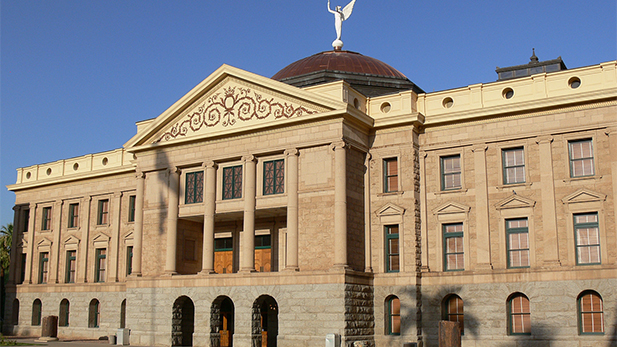 The Arizona State Capitol Building
The Arizona State Capitol BuildingWhen Gov. Doug Ducey delivers his State of the State address at the opening of the legislative session on Monday, money will be a prime focus for everyone in the room.
Ducey is expected to unveil the second part of his plan to fund K-12 education in Arizona. Many on both sides of the political aisle are eager to talk about that subject.
Closer to home, elected officials in Southern Arizona want to talk about more than just education funding.
“We are just concerned. They had taken some of our revenue sharing when the state was in such big trouble after the recession and we are hoping to get all that money back,” said Marana Mayor Ed Honea.
Tucson Mayor Jonathan Rothschild and Pima County Board of Supervisors Chair Sharon Bronson share that sentiment. Bronson wants the Legislature to not only return the money but change the distribution formula.
“Compared to the other urban county, Maricopa County, for the unincorporated areas -- we are out of balance,” said Bronson. “Our citizens, our residents do not get as much on a per capita basis as those in Maricopa County.”
That is because the funding formula for state-shared revenues includes people living in incorporated areas and excludes those who don’t in the per capita calculations.
That drives Tucson Mayor Rothchild’s hope that the Legislature will make it easier for cities to annex unincorporated areas.
“The state shared-revenue system basically gets us our tax money back, our sales tax money back, our income tax money back based on percentage of incorporated residents,” said Rothschild.
Another area of potential funding could be the reinstatement of highway user funds state lawmakers swept in recent years. A memo from Pima County Administrator Chuck Huckelberry said that would bring $6 million back to the region.
Supervisor Bronson called highway dollars an economic development tool because the money helps improve and maintain infrastructure. She said businesses look at infrastructure when deciding on an area.
Bronson also said she wants the state to take responsibility for its expenses and stop shifting costs to the counties.
“At this point, a third of the dollars that we collect in property tax, primary property tax, go back up to Phoenix to pay for state services. That certainly isn’t equitable for our residents,” said Bronson.
Tucson-area officials have other priorities, too. One for Mayor Rothschild is more local autonomy.
“We want to protect and enhance our local authority and decision making. I think we believe across the board at the city level -- including every mayor at the League of Cities and Towns, regardless of political affiliation – that a healthy state is a state that allows cities to innovate, to experiment and try new things,” said Rothschild.
Tucson is involved in a legal fight with the state over how it disposes of seized guns. The city destroys them. Under state law, they must be sold. Mayor Rothschild says he hopes to get that law repealed, though he does not hold much hope that will happen.
On Pima County’s wish list is criminal justice reform. That includes a desire to designate some criminal misdemeanors as civil penalties on first offense, including driving on a suspended license and littering.
The Legislature’s focus, as always, will be on the budget, particularly educational funding and how to deal with the higher minimum wage. Some of the issues important to local governments may be too far down the agenda.
On Monday, the governor posted a series of tweets promoting the hashtag #AZBoundless, including one landscape image with the words "Boundless Opportunity 2017." In one video, Ducey speaks about family safety as well as solutions in a "21st-century economy."
The governor also talks about "providing the next generation with a high-quality education that prepares them for life and the world."
No matter where you’re from. No matter your background. In Arizona, the opportunities are boundless. #AZboundless pic.twitter.com/hJgzWXJe8Z
— Doug Ducey (@dougducey) January 9, 2017
2017. #AZboundless pic.twitter.com/VisrXRfdGD
— Doug Ducey (@dougducey) January 9, 2017

By submitting your comments, you hereby give AZPM the right to post your comments and potentially use them in any other form of media operated by this institution.